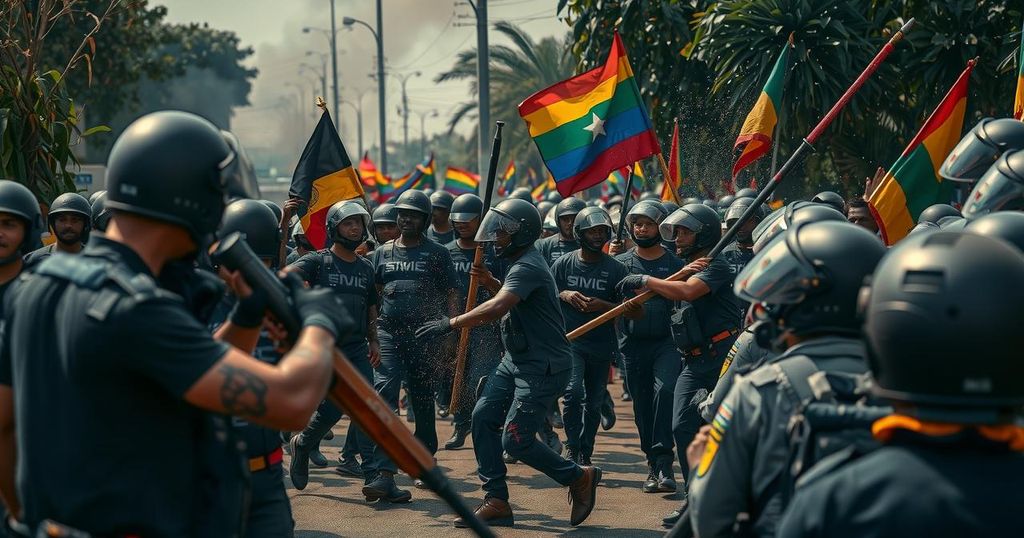Mozambique: Police Disperse Protests Following Controversial Election Results
Following Mozambique’s presidential election, riot police used tear gas to disperse a protest against alleged electoral fraud in Maputo. The demonstration occurred after two associates of opposition leader Venancio Mondlane were shot dead. Amidst rising tensions, Mondlane called for a general strike, claiming significant disruption of services nationwide. The situation has prompted condemnation from international entities, emphasizing the ongoing struggles for democracy in Mozambique.
Riot police in Maputo, Mozambique, utilized tear gas to disperse a crowd protesting alleged electoral fraud following the recent presidential election. The demonstration occurred just days after the fatal shootings of two associates of opposition leader Venancio Mondlane. Eyewitnesses reported a scene of chaos as heavily armed police moved forcefully through the streets, with some officers reportedly discharging their firearms. Despite the presence of law enforcement, the protest brought together several hundred individuals, including journalists, who were caught in the rapidly deteriorating situation. Notably, Adriano Nuvunga, director of the Centre for Democracy and Human Rights in Mozambique, noted that both two journalists and a security guard sustained gunfire wounds, though none of the injuries were life-threatening. Opposition leader Venancio Mondlane, who recently campaigned for the presidency in the elections held on October 9, called for a general strike to contest the preliminary results that indicate the continued dominance of the ruling Frelimo party. The unrest led to numerous shops closing across Maputo and the presence of helicopters patrolling the city of approximately one million inhabitants. Mr. Mondlane recounted his experiences during the demonstration through a video posted on Facebook, stating, “I had people at my doorstep, including the police. It took me an hour to get out.” His presence at the protest highlighted the increasingly contentious political climate. The backdrop to this unrest includes the recent killings of lawyer Elvino Dias and candidate Paulo Guambe, who were attacked while in a vehicle. Their deaths have significantly escalated tensions within Mozambique, prompting condemnation from the European Union, African Union and United Nations. UN Secretary-General Antonio Guterres issued a statement urging all political factions in Mozambique to maintain peace and eschew violence. The head of the African Union expressed deep concern over the reported post-election violence. Meanwhile, reports from US-based observers have indicated deficiencies in the electoral process, such as intimidation and discrepancies in voter rolls, raising questions about the legitimacy of the vote amidst low turnout projections. As the political situation develops, President Filipe Nyusi, who is concluding his second term, has seen his party’s candidate, Daniel Chapo, emerge as the leading contender in the elections. Other candidates include Ossufo Momade of the primary opposition group Renamo. Mondlane claimed that the call for protest was widely heeded, asserting that it resulted in a significant disruption of services nationwide. In his words, “The country was paralysed… 95 percent of private and public services across the country were paralysed.” This incident underscores the growing division and unrest within Mozambique’s political landscape.
The recent events in Mozambique are rooted in the contentious political climate surrounding the October 9 presidential election, which has been marred by accusations of electoral fraud and violence. The ruling party, Frelimo, has dominated the political scene since Mozambique’s independence nearly half a century ago, leading to significant disillusionment among opposition groups who argue for fairer electoral practices. The aftermath of the election has stirred protests, especially in light of violent incidents targeting opposition members, illustrating the broader struggle for democratic processes in Mozambique.
In summary, the police’s forceful response to the opposition protest in Mozambique underscores the heightened political tensions following disputed election results. With allegations of electoral fraud and the tragic killings of opposition members, the situation remains volatile as calls for justice and electoral integrity continue to resonate. The international community’s reaction further emphasizes the need for a peaceful resolution and adherence to democratic norms in Mozambique.
Original Source: www.aljazeera.com




Post Comment